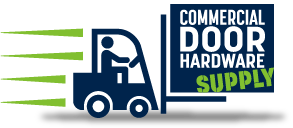+Shop
FAQs
Q. How do I determine the handing for a lock?
A. To determine the handing of a door lock, stand outside (the side requiring a key if applicable) the room or building facing the door:
- Hinges are on your left and the door swings away from you = LH: Left Hand
- Hinges are on your right and the door swings away from you = RH: Right Hand
- Hinges are on your left and the door swings toward you = LHR: Left Hand Reverse
- Hinges are on your right and the door swings toward you = RHR: Right Hand Reverse
For more information see our page on door handing.
Q. What is a reversible lock?
A. A lock which by reversing the latch bolt may be used on either a left or right hand door.
Q. What is backset and how do I determine the backset for a door lock?
A. Measure from the edge of door to the center of the bore hole or the lock body that you are replacing. Most backsets are either 2-3/8" or 2-3/4".
Q. What do the different lock functions mean?
A. Lock functions control the flow of people through a building. For more information please see our Lock Functions page.
Q. What is the difference between a single cylinder and a double cylinder lock?
A. A Single Cylinder is controlled by a key on the outside and a turn knob on the inside.
A Double Cylinder is controlled by a key on both the outside and inside. Normally used where you have glass next to the lock, which can be broken and the lock opened if a turn knob was there.
Q. What is a cylindrical latch or cylindrical lock?
A. This is the most common type of latch/lock found on doors in the U.S. They are used on most standard pre-drilled factory doors. You may not recognize the entire part, but the Latch Bolt should look familiar to you, as it sticks out the edge of a door.
Q. What is a mortise latch or mortise lock?
A. A mortise lock is a lock that requires a pocket to be cut into the door in which the lock is to be fit. Mortise locks are found on older buildings, but they have recently become more common in commercial construction. They are designed to fit in a cavity that is approximately 7" long by 2" to 6" deep in the edge of a door.
Q. How do I know the best lock option to use?
A. This mostly depends on the level of security needed or desired, emergency egress codes, and whether the lock is going on an interior or exterior door. Contact us for more information.
Q. What is a dead locking latch bolt?
A. A higher security latch bolt incorporating a plunger that is held in a retracted position when the door is closed, preventing it from being slipped open (by a credit card). Usually on keyed levers and knobs.
Q. What is a strike?
A. A metal plate that receives the door bolt or latch when the door is closed. Strike plates come in many shapes, styles and sizes for different applications.
Q. How do I mount the face plate on the latch?
A. Insert the latch into the face plate opening, ensuring that the sides of the face plate line up with the flat surface on the latch collar. Push flush with the drive-in collar. Then grasp the face plate in one hand and the latch in the other hand and rotate the face plate clockwise to snap in to the collar.
Q. How do I know which type of hinge to use?
A. For standard door applications either interior or exterior, standard butt hinges cover most applications. A continuous hinge (also known as a “piano hinge”) is best suited for functionality of heavier doors, high traffic doors, replacing worn or broken pivots, or replacing the door on an already existing frame that has different hinge locations.
Q. What is a butt hinge?
A. They can found on most commercial doors. The two leaves of the hinge are connected together with a pin. Hinges are actually quite important and can go a long way in either increasing or decreasing both the security and longevity of your doors.
Q. What is a door closer?
A. A door closer is a mechanical device that controls and closes a door, typically after someone opens it. Choosing a door closer requires the consideration of a variety of criteria including the closer's performance in fire situations, control over the rate of closing, safety, durability, risk of vandalism and aesthetics.
Q. How do I choose the best door closer for my application?
A. The volume of usage the closer will endure each day, and the weight and size of the door determine the type of closer needed for door conditions. For additional information please read our door closer information page.
Q. What is an active and inactive door in a set of double doors (pair of doors)?
A. The active door is the one that opens first and to which the lock is applied. The inactive door opens only after the active door and is locked in place with Flush Door Bolts or Surface Mounted Door Bolts.
Q. What is the thickness of a standard door?
A. In the U.S. most doors are 1-3/8" or 1-3/4" thick. Most standard door hardware is manufactured to fit 1-3/8" - 2" thick doors. Some manufacturers have extension kits, or will build a lock to fit a thickness over 2 inches. A typical residential interior door is 1-3/8" thick and an exterior door is 1-3/4" thick. Interior and exterior commercial doors are usually 1-3/4" thick.
How to determine your misc. hardware needs.
- Latch guard is for added security purposes.
- Drip guard prevents water getting on the face of the door.
- Wall stops prevent the door from damaging the wall that the door swings towards.
- Kick plates are for doors where is someone is walking with their hands full often, pushing carts or another reason they would kick the door vs use handle.
- Weather stripping is for exterior doors to prevent drafts or unwanted weather from getting in and for temperature controlled facilities.
Threshold measurements:
- W= The desired thickness of the threshold
- L= The distance between the jambs
- H= The desired height coming off the ground no greater that ¾”(anything higher then becomes a trip hazard.)
Need more information?
Feel free to contact us anytime with questions. You can call us at 844-DOORNOW (844-366-7669)
*NOTE: The content of this page is presented for informational purposes only and is not meant to serve as complete door hardware installation or usage instructions, which are provided by the manufacturer. Commercial Door Hardware Supply is not responsible for installation or performance of hardware it sells, and cannot be held liable for improper installation.
Company Info
Resources
Why Buy From Us?
 Huge Inventory
Huge Inventory
 No Hassle Returns
No Hassle Returns
 Satisfaction
Satisfaction
 Guaranteed
Guaranteed


News & Updates
Sign up to get the latest on sales, new releases and more …


 Huge Inventory
Huge Inventory Guaranteed
Guaranteed